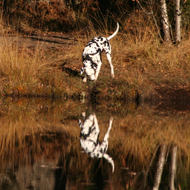Blue-green algae found at Brooklands lake

'There is no effective way to prevent or remove blue-green algae from waters like Brooklands Lake.' (stock photo)
The Environment Agency has confirmed the presence of blue-green algae in Brookland's Lake, Dartford. Last month, three dogs died after drinking the water and a number of others required extensive veterinary treatment.
Water samples taken from the lake revealed low levels of the algae, but one area has a high concentration that could be harmful to human health, and is toxic to animals.
The lake was cordoned off while tests were carried out but has since been reopened, apart from a small section. Warnings are in place around the lake and will remain there until the algae levels drop down to a 'safe level', according to the Environment Agency, which will continue to take regular water samples for testing.
Blue-green algae was also found in the lake back in 2013 following a spell of hot weather. In a statement last week, the agency said: 'There is no effective way to prevent or remove blue-green algae from waters like Brooklands Lake.'
Members of the public are urged not to swim or paddle in the lake, not to allow children or pets to play in it and not to drink the water or allow their dogs to do so. Owners should also keep their dogs on a lead.
If anyone should come into contact with the algae, they are advised to wash the area thoroughly and seek medical advice.



 The Veterinary Medicines Directorate (VMD) is inviting applications from veterinary students to attend a one-week extramural studies (EMS) placement in July 2026.
The Veterinary Medicines Directorate (VMD) is inviting applications from veterinary students to attend a one-week extramural studies (EMS) placement in July 2026.